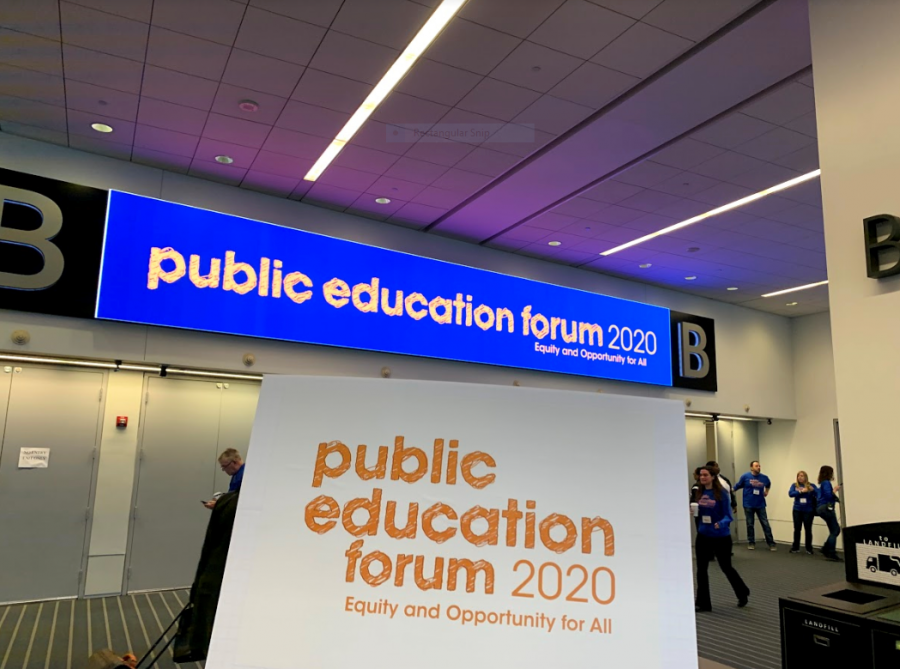Dem presidential candidates come to Pittsburgh, debate education issues
December 16, 2019
As the race to gain the Democratic presidential nomination intensifies, seven candidates came to Pittsburgh this weekend and turned their attention to education.
The candidates spoke at the Public Education Forum on Saturday at the David L. Lawrence Convention Center downtown. They talked about the importance of education and how it affects other national issues.
“The better the education, the better off everyone else is,” former Vice President Joe Biden said, summarizing the general opinion of all the participants.
The forum focused primarily on education, but other national issues arose at times. Candidates were questioned one at a time by moderators Ali Velshi and Rehema Ellis of MSNBC and also took questions from the audience.
Candidates discussed the hot topics of inequities in public school funding, school safety, teacher and support staff salaries, standardized testing, early childhood education, and post-secondary education.
Pushing to eliminate privatization and instead rebuilding public schools was a common discussion point among the candidates.
“Public school money needs to stay in public schools,” Sen. Elizabeth Warren of Massachusetts said. “We must make sure every public school is an excellent public school.”
Sen. Bernie Sanders of Vermont agreed.
“Many of our school districts are grossly underfunded,” Sanders said. “We are the wealthiest nation in the history of the world. We have the resources to make sure kids get the education they need.”
The candidates all said they want to increase funding for Title 1 schools to ensure that disadvantaged children receive the resources they need. Six candidates called for tripling Title 1 funding, while Warren wants to quadruple it.
“Poor kids are being punished for being poor,” South Bend, Ind., Mayor Pete Buttigieg said. “The nation will not reach its full potential with these inequities.”
The other candidates agreed about the need to support impoverished public schools, many noting that schools in America are becoming more segregated than ever, despite it being 65 years after the landmark Supreme Court case Brown v. Board of Education.
“Parents’ incomes are determining the quality of education,” Sen. Michael Bennet of Colorado said. “Equal is not equal … more money goes to wealthy schools than the poor schools. We need to do the opposite of this.”
Bennet also had a unique proposal that the traditional school year should be changed, saying that 181 school days is not sufficient for disadvantaged children who need extra time in the classroom.
“I believe our school calendars are too short. If it were up to me, kids would go to school six days a week. One hundred eighty-one school days are not enough for children living in poverty,” Bennet said.
Multiple candidates focused on early childhood education as well, with Biden even proposing full-day school starting at age 3.
“If I had ten dollars, I’d spend seven of it on Pre-K,” Biden said.
Warren agreed about the importance of educating the next generation, calling for “full day care available to every one of our babies. This can be funded by a 2 percent wealth tax,” Warren said. “Parents can go from part-time jobs to full-time jobs.”
While there was an overall agreement that early education should be a priority, the candidates’ thoughts on college tuition differed.
Both Sanders and Warren want to make public colleges and universities free and to cancel student debt for all Americans.
Bennet, the first school superintendent to run for president, suggested greatly reducing the cost of college, but not making it entirely free. Biden proposed making community college free for everyone, saying that a large number of community college graduates have gone on to have successful careers.
Sanders, meanwhile, said that college athletes should receive compensation from the NCAA.
“If these kids are bringing in big revenue, I think they are entitled to a paycheck as well,” Sanders said.
Another important issue that came up was finding a way to pay teachers more and to get them the resources they need to better their curriculums and classrooms.
“We need to pay teachers a salary for them to be able to support their families, and still be able to teach in public schools,” Warren said.
Biden and Sanders both suggested a minimum $60,000 salary for public school teachers.
The overriding concept of the day, though, was the importance of education for America’s future.
“Education is the foundation for social and racial justice,” California hedge fund manager Tom Steyer said.
Sen. Amy Klobuchar of Minnesota agreed that education has a huge impact on social equality. She said her first action as president would be to fire current Secretary of Education Betsy DeVos, who has been criticized by Democrats on many issues.
“You have to have people that you put into power so they make sure they’re protecting the rights of LGBTQ, persons of color, and immigrant students,” Klobuchar said.
The 2019 National Teacher of the Year, Rodney Robinson, asked Warren how to increase diversity among educators, saying that students learn better from teachers who understand and respect their culture.
Warren proposed canceling all student debt, so that more black students could see a pathway to college, without being restricted by the cost and loans. She also plans to invest $50 billion in historically black universities and colleges.
Biden hit a universal theme when he asked the audience to consider the effect of educators.
“I’ll bet every one of you could name a teacher that changed your life, and made you believe in yourself,” he said.






